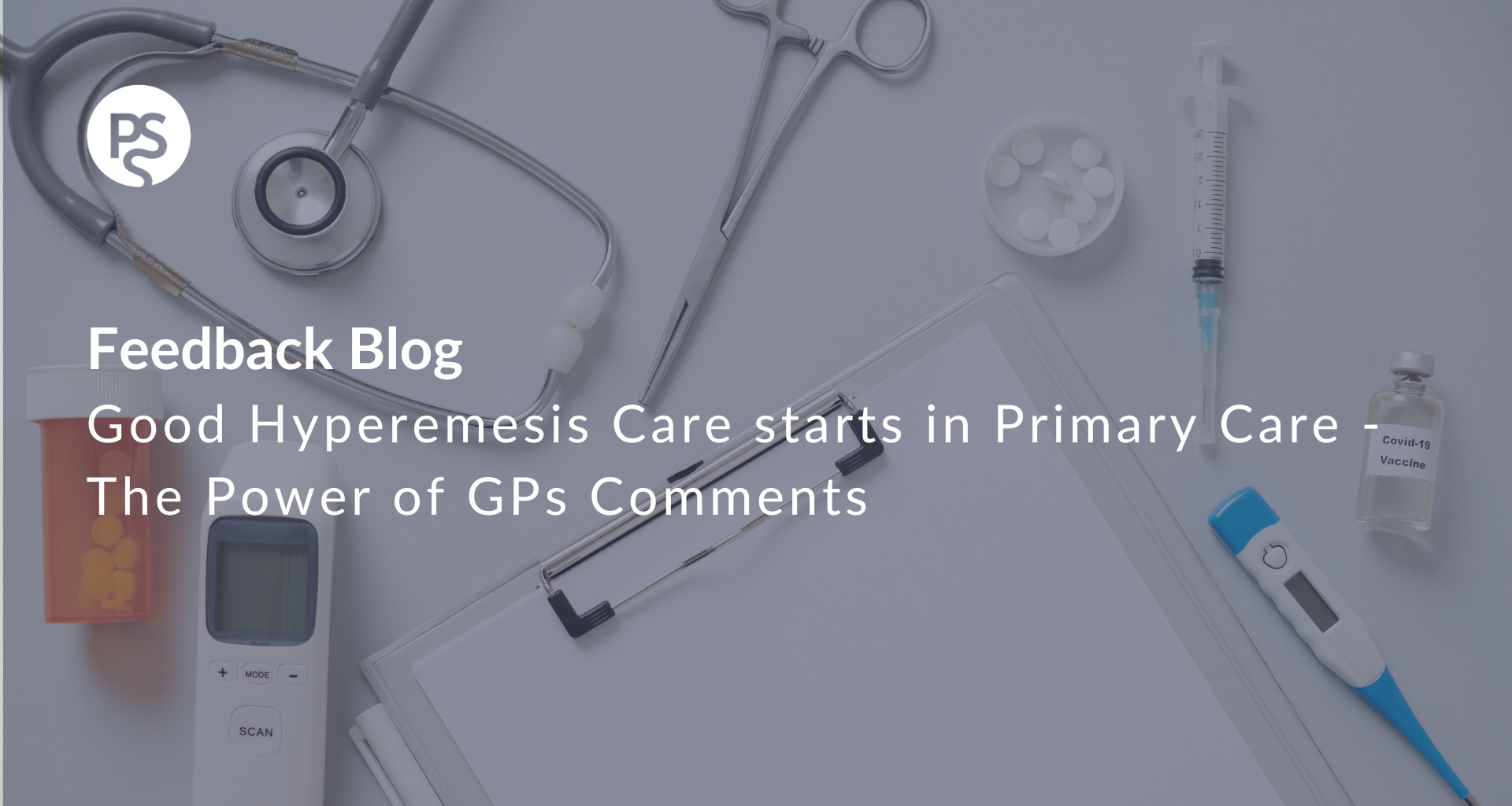Good Hyperemesis Care starts in Primary Care
In response to our recent post on social media about things General Practitioners (GPs) have said to Hyperemesis Gravidarum (HG) sufferers, we were inundated with hundreds of examples of unhelpful, misinformed, uneducated and downright bizarre comments. Whilst many are laughable, some are undoubtedly dangerous and the negative impact of such hurtful and ignorant comments at a time when women are feeling so incredibly vulnerable, cannot be understated.
I have no doubt that most of these comments were made by well-meaning GPs who did not intend any harm, but they highlight the huge gaps in understanding amongst primary care professionals when it comes to pregnancy related sickness. I don’t mean to underestimate the incredible work that GPs do in very challenging circumstances, and they can’t possibly know about everything, but HG care is something GPs need to know more about.
It is important to note that many women who commented also mentioned that they had also had very positive experiences with other GPs or healthcare professionals which indicates the variety of experiences women and birthing people have throughout their pregnancy journeys. These disparities make it very challenging for women to navigate their own care.
Is HG a Primary Care Issue?
The biggest challenge we face is that there is a belief amongst GPs that Hyperemesis HG is a Secondary care issue. Whilst that is true if symptoms are severe and women need admission for IV Fluids and anti emetics, in many cases this could be avoided if Primary Care professionals were better equipped to manage HG. This starts with education. GPs get no specific education in HG and even those who are lucky enough to do an Obstetrics and Gynaecology rotation, will have experience of treating HG sufferers but no actual training in the condition.
“You’re pregnant, what did you expect?”
The most frequent comments women have received from GPs have been “You’re pregnant, what did you expect?” when they complain that they are extremely nauseous and vomiting continuously. It is clear from such comments that GPs don’t understand the very basics of Nausea & Vomiting in Pregnancy; that it is a spectrum condition and ranges from mild to severe; and then there’s HG. The fact that some women suffer more severely with nausea and vomiting during their pregnancy is not an indication of their ability to cope but of the severity of their symptoms.
“It’s a good sign that you’re sick”
An important and potentially dangerous misconception amongst many healthcare professionals regarding HG is that “it’s a sign of a healthy pregnancy”. Sadly, this is not necessarily the case. We hear heartbreaking stories of women every day who have experienced HG and pregnancy or baby loss. It is an extra layer of cruelty that some women suffer so badly for weeks or months only to experience a miscarriage or stillbirth when they should be starting to see an improvement in their HG symptoms. It leads many HG sufferers to experience higher anxiety in subsequent pregnancies because they know that HG is not a guarantee of a happy ending.
Old Wives’ Tales
There are so many misconceptions that come through the many comments inspired by our post with many focusing on old wives’ tales such as:
“Have you tried ginger?” or
“You need to get those sea bands” or
“Try eating dry crackers before you get out of bed”
Just the mention of ginger can lead HG sufferers to become enraged even if it’s years after their pregnancies as they have heard it so many times. Not only does ginger NOT help with HG, it burns on the way back up and increases reflux which many women suffer from anyway. We often joke at the charity that if we had a pound for every time women are told to eat ginger, we would never have to fundraise again!
These comments might not be the most hurtful that women and birthing people hear throughout their pregnancy but it shows a complete lack of understanding about how debilitating and serious the symptoms of HG truly are. Many of these comments were made to women who had just been admitted hospital for IV Fluids and were on a cocktail of anti emetic medications. The idea that such devastating symptoms could be overcome by something as simple as eating a ginger biscuit is offensive.
The additional aspect when these comments are made by Healthcare Professionals such as a GP is that they break down trust with patients. Healthcare Professionals should rely on research and an evidence base when determining treatment plans rather than old wives’ tales and hearsay.
“HG is all in your head”
Another damaging thread is the suggestion that women’s symptoms are “All in their heads”. This notion of HG being a psychosomatic condition harks back to the time of Dr Freud and his Psychodynamic theories, a significant part of which suggested that women were hysterical and unconsciously rejecting their babies because they didn’t want to be pregnant. But no, Dr Freud, HG is NOT all in our heads. Nausea and vomiting are physical symptoms of a physical condition and in most cases, these are very much wanted babies. HG is not a sign of women not wanting their baby although almost 50% will consider termination due to the severity of the condition.
Toxic positivity
A parallel theme is one that can only be described as toxic positivity which often looks like comments such as “if you go out for a walk you’ll feel better” or “perhaps if you go to work, it’ll take your mind off things”. No amount of positive thinking is going to stop the vomiting. No amount of distractions will stop the soul crushing nausea that many of us feel and the thought of concentrating on anything seems impossible. Again, this type of comment leaves women and birthing people feeling misunderstood, and as though they are failing at pregnancy because they can’t cope with a bit of “morning sickness”.
The Reality of HG
Those with lived experience of HG know that this is not true. HG is so far beyond anything that resembles normal pregnancy sickness (sorry but I can’t even bear to write the other term as it is inaccurate and dismissive) but it seems that sadly, unless you’ve lived through it or watched a daughter, partner or friend go through it, it is impossible to understand.
As a charity, Pregnancy Sickness Support works hard every day raising awareness of HG and the reality of what women are going through when they are experiencing it. We work hard to educate healthcare professionals about the latest research, evidence based guidelines and best practice for treating this horrendous condition.
Yet still, women are met with a lack of understanding and knowledge when they approach their GPs for help. If only GPs knew that HG falls under the responsibility of Primary Care AND Secondary Care perhaps women would receive significantly better care. It is clear that GPs are in need of better education in HG and this is a priority of Pregnancy Sickness Support moving forwards. Please visit our Professionals Hub on our website for more information and to book onto our training. Good HG care starts in Primary Care.
Written by Lindsay Salmon, Community & Engagement Manager.




